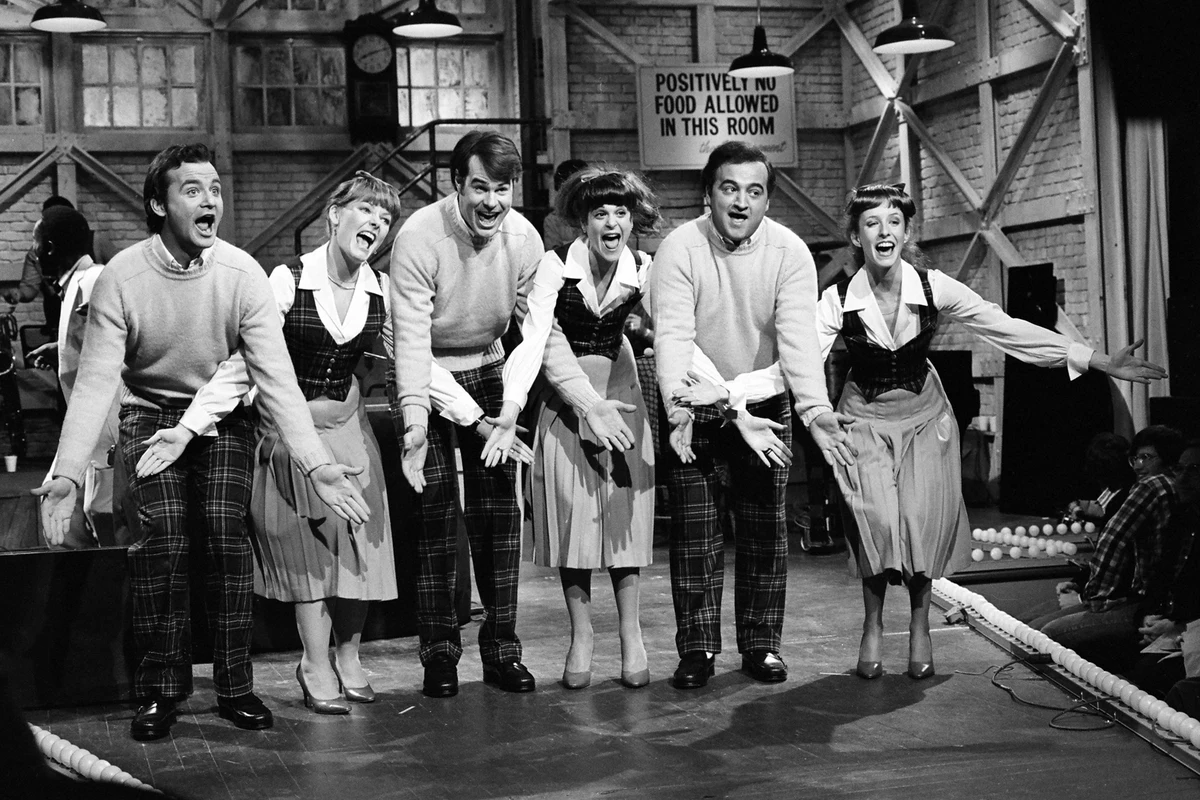“Saturday Night Live movie” has long been a warning sign for audiences, owing to the checkered history of films based on sketches and characters from the venerable live late-night comedy series. But the phrase has taken on a new excitement with the announcement of writer-director Jason Reitman’s SNL 1975.
Reported to be a portrait of the hectic events of October 11, 1975, when young Canadian producer Lorne Michaels gathered together a shaggy ensemble of actors and writers to produce an anarchic late-night comedy show on American TV, SNL 1975 has Saturday Night Live fans undeniably excited. That despite there being no set release date, with some estimates suggesting Reitman’s film won’t hit screens until it can coincide with the show’s astounding 50th anniversary in 2025.
Casting is underway, however, with SNL enthusiasts and critics alike picking apart the choices of Reitman and filmmaking partners Gil Kenan, Jason Blumenfeld, and Erica Mills’ choices to embody the legendary Not Ready for Prime Time Players (as the original cast was cheekily known), Michaels, and various other key Saturday Night Live figures. Indeed, so indelible are the on- and offscreen personas of this motley crew of television pioneers, the assembled cast is no doubt feeling the pressure to not only hone their impressions but to convey the spirit of youthful comic genius in a bottle that was SNL’s initial explosion on the small screens of a post-Watergate America.
Taking on those roles are a mix of newcomers and recognizable faces like New Girl’s Lamorne Morris as Garret Morris (no relation), The Maze Runner’s Dylan O’Brien as Dan Aykroyd, Kim Matula as Jane Curtin, Ella Hunt (Anna and the Apocalypse) as Gilda Radner, Emily Fairn as Laraine Newman, Cory Michael Smith as Chevy Chase, and Matt Wood as John Belushi. The Fablemans’ Gabriel LaBell is on board essaying the young Lorne Michaels, with other pivotal backstage figures being played by Cooper Hoffman (as NBC junior executive and SNL co-creator Dick Ebersol) and Rachel Sennott (Bottoms) as writer (and Michaels’ then-wife) Rosie Shuster.
There’s still no word on who will be playing some other colorful players in the SNL 1975, including infamously brilliant and difficult Michael O’Donoghue, filmmaker Albert Brooks (who’s hilarious but too long submissions were quickly phased out of the show’s mix), and first-ever host George Carlin, who admitted to being on so much cocaine that he rejected doing anything on that first show but his own stand-up material. And then there are first-season guests the Muppets, with contributor Jim Henson’s sunny hippie optimism clashing with the darker SNL sensibilities to the extent that O’Donoghue flatly refused to work with them. (“I don’t write for felt,” the acerbic “Mr. Mike” once proclaimed.) Beyond casting though, the biggest questions—and most perilous pitfalls—surrounding this slice of television history concern Reitman and partners’ approach to a story that’s already passed into entertainment legend, complete with all the self-mythologizing that goes along with that.
Reitman himself is no stranger to Saturday Night Live’s world. Even before he embarked upon his own successful directing career, the young Reitman was already in the show’s orbit through his father Ivan. A longtime friend and collaborator of future player Bill Murray (who, despite his later SNL stardom, did not join the show until its second season), Ivan directed both original Ghostbusters films (starring Murray and Aykroyd) and co-produced National Lampoon’s Animal House, which helped launch Belushi into superstardom. Indeed, Murray is on record joking that the curious young Jason was “a pain in the ass” hanging around the Ghostbusters set, while the younger Reitman went on to contribute a number of filmed segments for a 2008 episode of SNL before going on to relaunch his father’s Ghostbusters franchise, complete with the long-awaited return of Murray and Aykroyd.
That level of intimate familiarity with Saturday Night Live is a plus, certainly, with Reitman and Kenan basing their screenplay on new interviews with a wide-ranging array of the show’s original cast, crew, and writers. For a show as long-lived and groundbreaking as Saturday Night Live, there has been no shortage of books, interviews, and tell-alls about every aspect of the show over the decades. (Indeed, it seems that every third cast member has written their own memoir about trying to find their way in SNL’s notoriously competitive and pressure-filled environment.) So someone with Reitman’s SNL cred may be just what’s needed to unearth some new stories and insights.
Then again, perhaps Reitman will prove too close to his subject. Seminal books like Doug Hill and Jeff Weingrad’s Saturday Night: A Backstage History of Saturday Night Live and Tom Shales and James Andrew Miller’s Live From New York: The Complete, Uncensored History of Saturday Night Live have already mined interviewees for indispensable on-the-ground observations about the inner working of the show. Saturday Night Live itself has put out Lorne Michaels-approved documentaries about the show’s history over the years, while others like Bao Nguyen’s 2016 doc Live From New York have attempted to sum up the show’s cultural impact with an outsider’s perspective. For Reitman and his team, the sheer volume of information to work from is, paradoxically, what’s most likely to work against them. After all, what new can be said?
The reported focus on that one fateful premiere day seems promising. The pell-mell rush to airtime on that first show is ripe for energetic storytelling, as Michaels and his young turks clash with NBC execs and Standards and Practices over the show’s irreverent humor, and the ever-ticking countdown to 11:30 tests the neophyte TV pioneers’ untested skills and nerves. For a lifelong Saturday Night Live watcher familiar with the backstage and on-camera events of that first show, the opportunities for a thrillingly funny story of pulling victory from the gaping jaws of broadcast chaos is a tantalizing prospect.
Even beyond that behind the scenes TV tale, however, there’s ample opportunity for Reitman to explore the fascinating array of creative people he’s bringing to the big screen. Saturday Night Live came together roughly, with the inexperienced but driven Michaels steamrolling right through the staid and unsuspecting halls of NBC’s 30 Rockefeller Center with the steadfast arrogance of youth and determination. Along the way, he rolled over a lot of toes, kicking off the show’s infamous legacy of constant striving for airtime, creative competition, and frequent, crushing failure. Zooming in on this one moment in time offers a thoughtful filmmaker a chance to capture each of these now-legendary figures when they—along with NBC and the viewing public—had no idea what was coming their way.
There’s Belushi, the unquestioned star of National Lampoon’s stage and radio shows, who reportedly told Michaels in their unpromising first interview that his own TV was covered in spit. Dan Aykroyd was as brilliant and uncompromising as he was shockingly young, notably storming into and out of the interminable series of cast auditions in the character of a furiously impatient British man. Jane Curtin, cast to be the “normal looking” straight woman amongst a sea of freaks, was already growing tired of SNL’s boys club mentality, epitomized by the boorish Belushi’s misogynistic “women aren’t funny” bluster. Garrett Morris’ story is perhaps the most compelling of all, as the only Black cast member, already established as a film and theater actor, found himself subjected to the indignities only and all-white 1970’s writers room could muster.
And then there’s the inevitable, looming fact of the show’s self-destructive backstage culture, which notably culminated in the death of superstar John Belushi from a drug overdose at the age of 33. Michaels and company have used the intervening years to, if not whitewash their complicity in the show’s hedonistic, anything goes attitudes, then frame them as a product of their time. But any meaningful examination of Saturday Night Live’s earliest days needs to delve into how Belushi’s wild man anarchism was ignored, or even encouraged, as part of the show’s potently popular comic formula. That other performers like Radner, Newman, and Morris also sought increasingly dangerous relief from the show’s unceasing demands in various substances is just another theme that SNL 1975 must confront, regardless of the official narrative.
It’s an unenviable prospect for any filmmaker to try to balance the comedy and drama of the birth of Saturday Night Live. Looking to thinly-veiled television versions of SNL, there are opposing traps for Reitman to fall into, with Aaron Sorkin’s leadenly unfunny and self-important Studio 60 on the Sunset Strip on one side and SNL vet Tina Fey’s wacky workplace sitcom 30 Rock on the other. There are elements of both shows that could benefit SNL 1975, with Studio 60’s misguided ambition to place the show in a cultural context contrasting Fey’s affectionate insider’s take on the often ludicrous business of being funny for money. Pitching too far to the Sorkin side is deadly, too far down the Fey way hazarding crowd-pleasing glibness. (There’s the gnawing fear that the film will end with a jokey Animal House-style crawl explaining where each real life figure wound up.)
If there’s a sweet spot for SNL 1975, it rests in a precarious balance of the two poles, one Reitman will need to navigate despite the over-the-shoulder peering presence of the still very active and protective Lorne Michaels. There’s no indication that Michaels is in any way involved with SNL 1975, which is a good thing—as much credit as Michaels deserves, any worthwhile film about Saturday Night Live needs the appearance of creative independence. That’s the chief virtues of Live From New York and Saturday Night—both books clearly benefit from the participation of the actual figures being profiled while never shying away from the thorniest and most unflattering incident.
It’s up to Jason Reitman to craft a similarly thoughtful, insightful, and creatively autonomous film about one of the most important TV shows ever, all while managing the egos of the very famous and powerful figures he’s known all his life, and which he’s now presenting on screen. No problem—it’s not like he’s putting on a live, 90-minute comedy show or anything.
30 Best ‘Saturday Night Live’ Characters
Much of the show’s humor stems from impersonations, but ‘Saturday Night Live’ has also created a long list of memorable recurring characters.
Gallery Credit: Corey Irwin







